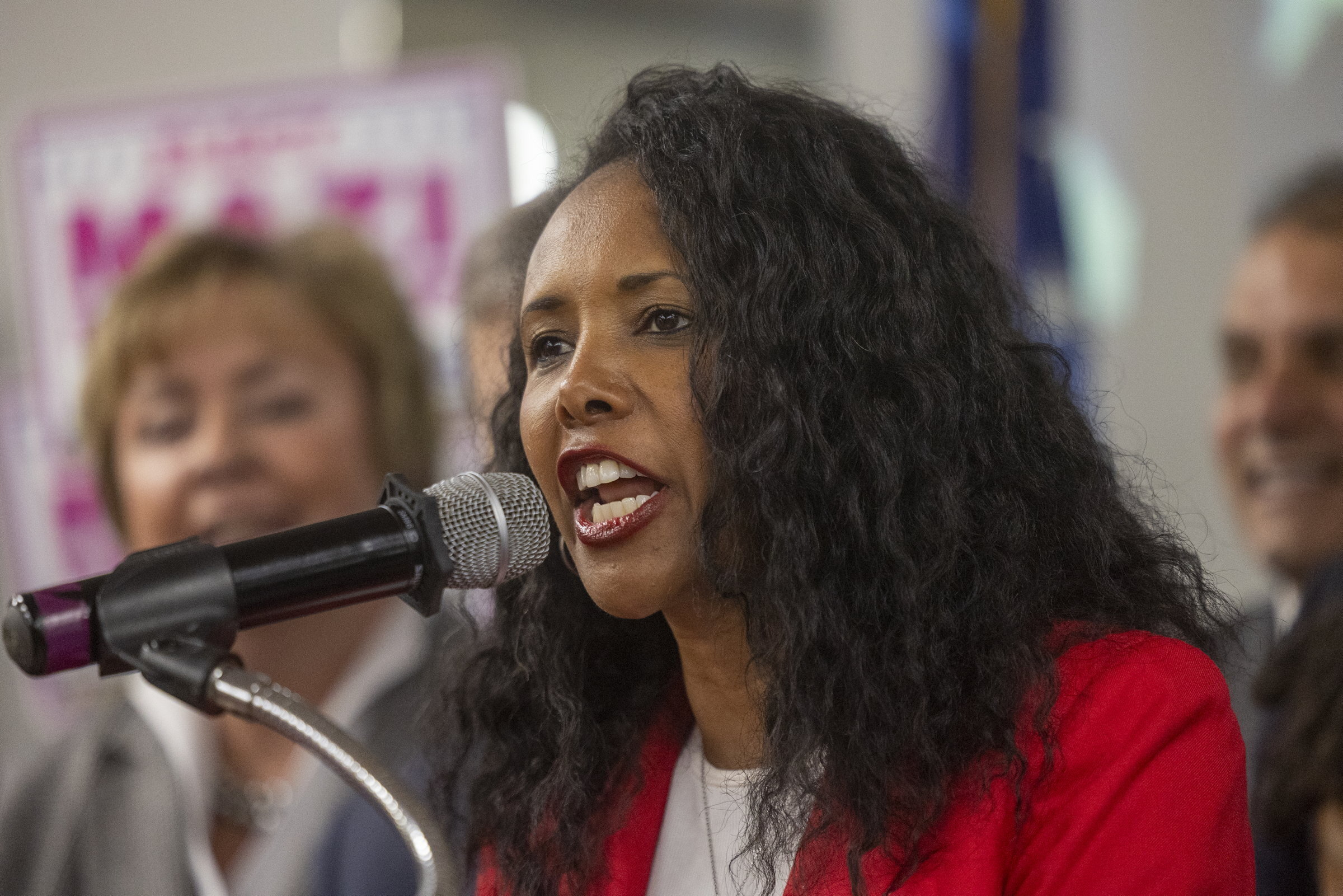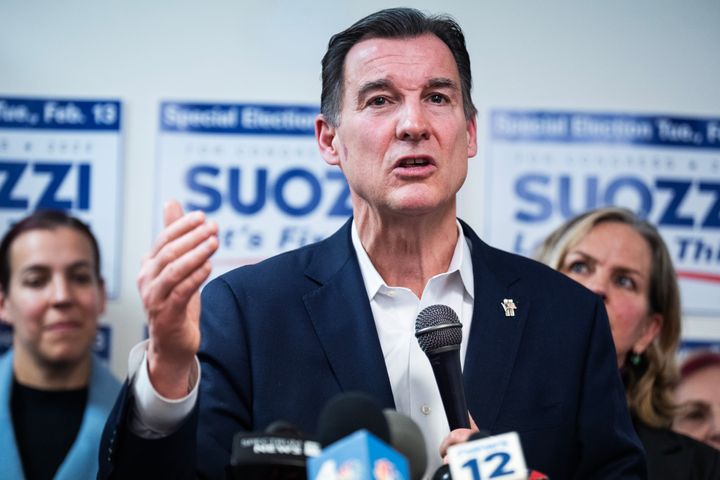
In late January, the 19-member Nassau County legislature cast a critical vote on how to divvy up $262 million in federal aid left over from President Joe Biden’s American Rescue Plan, which delivered billions of dollars in aid to states and cities across the country.
The vote broke down along partisan lines. Eleven Republicans approved the package, rolling $222 million into the county’s general fund, allotting $25 million to the sewer and stormwater fund, and $15 million for community projects.
All of the body’s seven Democrats voted against the bill on the grounds that they should have set aside $19 million for community projects and given each member authority to distribute $1 million, rather than giving the GOP county executive control over how it is distributed.
One of the chamber’s 19 lawmakers was unaccounted for, however. Mazi Melesa Pilip, a two-term county legislator from Great Neck and the Republican nominee for New York’s 3rd Congressional District, walked out of the county legislative meeting without casting a vote.
Her absence during a key legislative vote has become a symbol, to Democrats at least, of Pilip’s evasiveness on difficult issues and her lack of readiness for higher office.
“If you’re going to go down to Congress, and if there’s a tough vote, you’re going to run out of the room ― how does that represent our district?” asked Nassau County Minority Leader Delia DeRiggi-Whitton (D).
Pilip faces former Rep. Tom Suozzi (D) in a Feb. 13 special election to fill a seat vacated by indicted former Rep. George Santos (R). The election in a swing district (it has a Cook Partisan Voter Index score of D +2) is seen as a potential bellwether for how suburban voters feel about the political environment ahead of the presidential election in November. Democrats have spent $9.7 million on the race, compared with Republican groups’ $6.2 million.
Newsday, the largest newspaper on Long Island, reported Pilip’s abstention from the budget vote in its Jan. 22 article about what occurred.
But DeRiggi-Whitton provided HuffPost with additional details about the circumstances leading up to the vote. She and other Democrats worried that giving the GOP executive authority over the distribution of the $15 million for community projects would lead to Democratic legislative districts losing out on their fair share of funding.
Shortly before the vote on the floor of the county legislature, DeRiggi-Whitton told Pilip that New York’s 3rd overlaps with significant parts of those Democratic legislative districts, and that her potential constituents in Congress could be shortchanged by the legislation as written. She encouraged Pilip to join them in calling for the bill to be modified so that the money would be distributed equally by district. Pilip walked out of the chamber shortly after the conversation, leaving in such a hurry that she left her coat on the chair, according to DeRiggi-Whitton.
Brian Devine, a spokesperson for Pilip’s campaign, denied that Pilip’s motivation had anything to do with DeRiggi-Whitton, or that was otherwise political in any way.
“Mazi left the meeting early that day to attend to a personal family emergency,” Devine said in a statement. “Nothing to say beyond that.”
Nassau County Legislator Siela Bynoe (D) confirmed to HuffPost that she saw DeRiggi-Whitton speak to Pilip, and then leave the chamber in a rush ― though she was not privy to the details of their conversation. Publicly available video of the meeting indeed shows Pilip leaving abruptly.
Bynoe, who represents communities with large Black and Latino populations, had invited nonprofit leaders from her district to speak with lawmakers about how county funding could help them address the needs of vulnerable constituencies.
“I don’t believe that Mazi would be able to represent that constituency in a fair and balanced way.”
- Siela Bynoe, Democratic Nassau County Legislator
Pilip’s decision not to vote “makes me feel as though we would not have a representative who understands the needs of the entire district,” Bynoe said. “I don’t believe that Mazi would be able to represent that constituency in a fair and balanced way.”
A spokesperson for Pilip’s campaign did not respond to multiple requests for comment about the budget vote.
Democrats argue Pilip’s absence on a politically tricky vote is of a piece with her efforts to avoid press scrutiny or engagement with her opponent. After refusing to take questions at her campaign announcement in December, Pilip held her first press conference on Jan. 25 ― and even then, relied on help from Rep. Anthony D’Esposito (R-N.Y.), who fielded questions alongside her. She has also refused to debate Suozzi until this Thursday, five days into early voting, and just five days before the special election comes to a close.
Pilip’s less-is-more strategy reached new heights on Jan. 27 when she was absent from a rally that House Majority Whip Tom Emmer (R-Minn.) headlined for her campaign. Pilip, a Modern Orthodox Jew, could not attend because the event took place on a Saturday, which is the Jewish sabbath. Asked at the event why Republicans held the event on Saturday, Devine told HuffPost that the Nassau County Republican Party always did its door-knocking shifts on Saturday.
“I find it odd,” former Rep. Steve Israel (D) said of the rally’s timing. “But it’s an affirmation of a strategy that’s intended to keep her under wraps.”
Unlike Santos, there is no evidence that Pilip is fabricating anything about her personal history. But Democrats still hope that her efforts to avoid scrutiny of her policy positions gives Santos’ former constituents a bout of déjà vu.
In a virtual press conference on Monday, Suozzi said he was reluctant to invoke serial fabulist George Santos, because Long Island voters had grown tired of hearing about him. “But I’ll bring up Santos in the context of Mazi Pilip because she’s being Santos 2.0,” Suozzi said in a Monday press conference.
“How can you not be transparent after George Santos? It doesn’t make any sense,” he added. “She’s not letting people know where she stands on things.”
After endorsing Suozzi on Friday, Newsday’s editorial board, which is not averse to endorsing Long Island Republicans, wrote a detailed anti-endorsement of Pilip focused on her evasiveness the following day. Noting that Pilip declined to meet with them for an endorsement interview, the newspaper said it spoke poorly of Pilip that she had yet to clarify, in detail, her positions on abortion rights and immigration policy.
“Nassau Republicans once again have put their brand behind an unknown and inexperienced candidate in the hopes their political machine can get out enough votes to put Pilip over the finish line,” Newsday’s editorial board wrote.
Indeed, while Pilip has said she would oppose a national ban on abortion, she has not specified what she defines as a “ban,” has not outlined her position on the U.S. military providing funding for service members to seek abortions out of state, or revealed how she plans to vote in a New York state ballot amendment this year enshrining abortion rights in the state’s constitution.

And though Pilip came out against the Senate’s bipartisan border enforcement deal on Monday, we still do not know her position on family-based immigration ― which enabled her to obtain legal status ― and whether she is open to any kind of immigration deal that would provide a path to citizenship to undocumented immigrants who came to the U.S. as kids.
In addition, HuffPost reached out to Pilip’s campaign for more information about her views on union rights and infrastructure policy and did not get a response. The New York State AFLCIO, the state’s largest federation of labor unions, said she did not seek their endorsement, even though the federation endorsed 10 Republican state legislators on Long Island in 2022.
Suozzi, by contrast, “did reach out, and as such, once again demonstrated his commitment to union members and their families,” Mario Cilento, president of the New York State AFLCIO, said in a statement. “He supports labor’s priorities, and he will be a strong voice for working people in Congress.”
Even as Pilip has given more interviews in recent weeks, she continues to leave key questions unanswered. During a televised interview on PIX11 last Tuesday, Pilip said she would not support Trump’s presidential run if he is convicted of a crime.
“Nobody is above the law,” Pilip said. “If he is convicted of a crime, he cannot represent us.”
But in a CNN interview on Sunday, Pilip welcomed Trump to campaign for her and would not answer directly when asked about a scenario in which Trump is convicted. She instead made clear that she considers the criminal cases against him “politically motivated” and without merit.
“I know that he didn’t commit any crime,” she said.
At the same time, Pilip refused to tell CNN for whom she voted in the 2016 and 2020 presidential elections.
Republicans shielded Pilip from press exposure for as long as possible, because they would rather the election not be about her, according to Larry Levy, a Long Island politics expert at Hofstra University. They instead believe they are best positioned to win if they frame the election as a referendum on President Joe Biden’s policies and the chaos at the United States’ southern border, Levy said.
“They think they’ve got Suozzi and the whole Democratic Party on the defensive so why not keep the focus off of her and make sure it stays on him?” he said.
The GOP’s strategy is intuitive on Long Island, where suburban voters have drifted right in recent years even as their college-educated counterparts in the rest of the country have grown more Democratic. Harnessing anger over the surge of asylum seekers, rising crime in New York City, and inflation, Republicans now dominate Long Island politics from the local level up to Congress. And the Nassau County Republican Party, in particular, has proven adept at mobilizing its newly elected officials and civil service functionaries to get out the vote.
“They have thousands of foot soldiers from local governments all over the counties and cash that they can raise from vendors and other people who see the Republican Party as their meal ticket,” Levy said.
Suozzi is nonetheless hoping that his moderate reputation, history with the district’s voters, and relentless focus on Pilip’s missteps will instead turn the election into a referendum on the two candidates’ relative competence and readiness for office.
“This is going to be a referendum on Suozzi vs. Mazi ― on somebody who’s got experience and a proven record and is willing to work across party lines, versus somebody who’s unprepared and unvetted, and will make things worse, and who’s taking the extreme partisan Republican position,” he said on Monday.
Disclaimer: The copyright of this article belongs to the original author. Reposting this article is solely for the purpose of information dissemination and does not constitute any investment advice. If there is any infringement, please contact us immediately. We will make corrections or deletions as necessary. Thank you.
